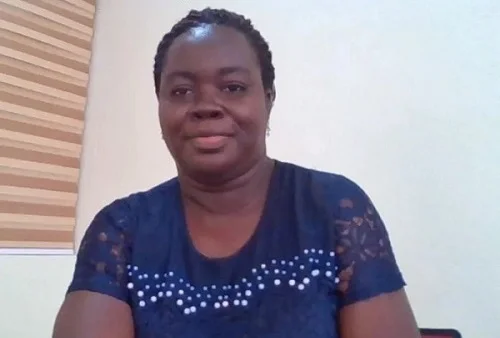Hot!
‘Body odour can push partners away’

The Director at the Department of Gender in the Upper West Region, Ms Charity Bature has advised married women to maintain a healthy body and practise good personal hygiene to keep their husbands at home.
She explained that having body odour due to lack of good personal hygiene could push married men away from the home and force them to “recruit” other women to perform the duties of wives.

She maintained that it was necessary for women to take very good care of their bodies, especially during their menstrual cycle to prevent them from infections and other issues.
Ms Bature stated this at a day’s workshop orgainsed by the department for female artisans in the region on sexual and reproductive health issues.
The programme, which was supported by the United Nations Population Fund (UNFPA) discussed issues such as safe sex devoid of sexually transmitted infections and diseases (STIs/Ds), personal hygiene during menstruation and sex as well as gender based violence (SGBV).
She explained that sensitisation programmes organised earlier by the Department of Gender had targeted females in the formal sector to the neglect of others, therefore, the workshop at Wa was to ensure that every woman was sensitised to SGBV issues regardless of their social status.
Ms Bature advised women to bath regularly, change their sanitary pads often, wash their private parts with only water to avoid rashes and other infections and also ensure that they discarded their sanitary pads appropriately.
She expressed the need for unmarried persons to abstain from sex but advised that if they could not, then they should indulge in safe and protected sex.
The director defined safe sex as “the use of condoms to reduce the risk of transmitting or acquiring STI/Ds” and said the only form of contraceptive that prevented the transmission of STIs was the condom.
She indicated that STIs/Ds such as gonorrhoea, syphilis and the human immunodeficiency virus (HIV) could cause symptoms such as fever, sores around the mouth, anal itching, bleeding and soreness, frequent urination as well as itching or redness around the genitals.
She cautioned women against having multiple sexual partners which according to her could easily lead to the acquisition of an STI/D.
Touching on SGBV issues, Ms Bature explained that if women were adequate and self-sufficient, the likelihood of suffering abuse from men would be quite minimal and urged them to develop themselves in order to remain independent.
“When women have their own means of sustenance, they will not overly depend on a man for their every need so that when the men withhold those needs from them they are unable to function,” she said.
In light of this, the director encouraged the women to endeavour to educate their female children and give them skills training to ensure that they were gainfully employed so they would not fall victim to unscrupulous men.
Some participants who spoke to The Spectator lauded the department for the training and said it had broadened their horizon how to handle issues regarding their reproductive health and family life.
From Lydia Darlington Fordjour, Wa
Hot!
Swedru All Blacks back to winning ways, Roshan humble King Faisal

Sekondi Rospak FC made it eight wins in eight successive home games after three second-half goals from John Amoah, Joseph Ntow and Stephen Anthony Kofi. John Amoah opened the scoring in the 55th minute after a barren first half. Joseph Ntow added to the tally in the 56th minute before Stephen Anthony Kofi rounded things up in the 74th minute to give Rospak a 3-0 win over former Premier League side King Faisal.
Elsewhere at Swedru – leaders Swedru All Blacks humbled PAC Academy in an emphatic 2-0 win. Zayat Bubakari scored first for Swedru All Blacks in the 27th minute before Rudolf Junior Nana Kwasi Mensah made it 2-0 in the 34th minute. Swedru All Blacks are top of the table with 36 points – 4 points ahead of second placed Rospak FC.
Meanwhile, Former Premier League side Cape Coast Mysterious Dwarfs recorded their fourth successive home victory after beaten New Edubiase United 2-1 at the Robert Mensah Park. Enoch Odoom struck first for Cape Coast Mysterious Dwarfs in the 19th minute but Steven Asante equalized for New Edubiase United before halftime. After the interval, Godfred Eshun scored from distance in the 65th minute to help Cape Coast Mysterious Dwarfs secure all the points.
Here are the results in Zone Two

Hot!
Cervical Cancer alert: Avoid sex at early age

The Programmes Manager of Non-Communicable Diseases (NCDs) of the Ghana Health Service (GHS), Dr Mary Efua Commeh, has advised young girls to avoid sex at an early age.
This, she explained, will give the cervix the opportunity to mature before they become sexually active.
“You need to delay what we call the first sexual intercourse as much as possible to give the cervix the opportunity to mature before the person becomes sexually active,” she said.
Dr Commeh stated this in an interview with The Spectator in Accra on Tuesday as a part of the Cervical Cancer awareness month.
According to her, cervical cancer was the second leading female cancer in Ghana with a total of about 3,072 cases annually, and out of that, 1,815 deaths are recorded, representing more than 50 per cent.
She indicated that “If young girls are going to be sexually active, then you need to talk to your parents about being vaccinated.”
She explained that vaccinating young girls against human papillomavirus (HPV) has been found to be a very effective way of preventing cervical cancer.
“There are countries that started HPV vaccination years ago and they are not seeing any cervical cancers now because they would have eliminated most of the high-risk HPVs in their women. So if the high-risk HPV is not there, then obviously the results on cervical cancers are going to go down,” she added.
Dr Commmey said the HPV vaccination is recommended for young girls aged nine to 14 years, adding that it had been found to be highly effective, not just for cervical cancers but for other HPV-related cancers, such as anal cancers, cancers of the vagina, genital warts, amongst others.
She further elaborated that the idea is to put up a barrier before the HPV comes in and that once a young female encounters it, she is already protected.
She also mentioned that for cervical cancers, the main cause is called HPV infection, saying generally, all sexually active women acquire HPV at some point in their lives.
However, the Programmes Manager of NCDs at the GHS mentioned that the body has a way of clearing the HPV, explaining that it is a natural mechanism that goes on, unfortunately, there are a few women whose HPV persists.
Moreover, she noted that the numbers for Cervical Cancer tend to be much higher because at times, clients would wait, and try all sorts of medications before they finally report to the health facility saying “we actually lose some women before they get to the hospitals with over 75 per cent of the cases coming in its third and fourth stages.”
Dr Commey, therefore, called for public awareness while ensuring the availability of information for prevention and control.
By Jemima Esinam Kuatsinu







